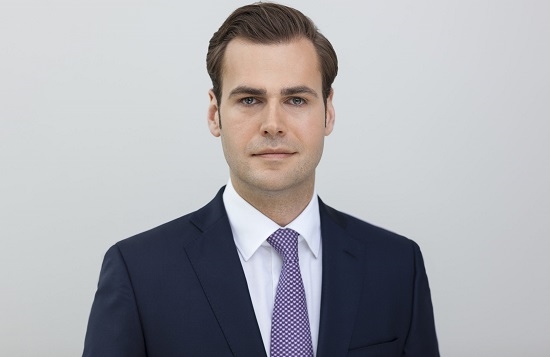Not only the war should cause caution on the equity markets

By Marcus Poppe, co-head of European equities at DWS
In a few days it will be the anniversary of Russia's invasion of Ukraine. But on the stock markets, the war no longer plays a role, despite the immeasurable suffering for soldiers and civilians of both parties to the conflict. After all, the problem of a possibly collapsing supply of raw materials in Europe has largely been solved. But a Russian spring offensive could quickly create a new situation. And it is not only this risk premium, which is completely absent from prices, that should give investors cause for caution.
For inflation and interest rates are likely to remain high, while profits and valuations seem to be largely exhausted at the same time. "Therefore, investors should not assume that the equity rally of the past weeks will continue in the same form," says Marcus Poppe, co-head of European equities at DWS. Investors with a long-term horizon should not be put off, but should pay a little more attention to balance sheet quality in view of the higher interest rates expected in the near future.
Experience in putting together rescue packages
Notwithstanding the fact that stock indices such as the Dax are now trading at pre-war levels again, the Russian invasion of Ukraine has of course significantly slowed economic development in many countries. The war is likely to cost the economies in the euro area one percentage point of growth in both 2022 and 2023. For Russia, a loss of almost seven percentage points is to be expected for these two years together.
Notwithstanding this, the slump in both the common currency area and Russia has been more moderate than initially assumed. Germany, for example, is miles away from the minus 9.4 per cent that the Prognos Institute had expected last summer. "It certainly contributed to this that fiscal policy was still in crisis mode anyway due to the coronavirus pandemic and therefore still in practice in putting together rescue packages," says Poppe.
Europe has also quickly become independent of Russian energy supplies. Private households, commerce and industry have reduced gas consumption by more than 20% compared to the average of previous years, especially in the last quarter of 2022, without a significant drop in production. At the same time, new suppliers were found, for example with Norway, which largely compensated for the loss of Russian supplies.
The bottom line is that the price of the forward contract for gas for delivery in February has thus fallen to 58 euros/MWh from 300 euros/MWh, which, however, still corresponds to about twice the average price of the years before.
Conversely, Russia has found new customers for its energy in the emerging countries, although this was associated with price concessions, some of which were considerable. In terms of imports, the emerging economies also ensured that numerous products remained available in Russia despite Western boycotts.
In the longer term, it is not the comparison with low expectations that counts
But it is not only Europe's economies that have so far escaped relatively unscathed, but also its businesses. In this respect, the timing of the Russian invasion has played a not insignificant role. After the coronavirus crisis, demand picked up, but industry had to contend with supply chain difficulties and was unable to meet demand at all in many areas. Therefore, order books were well filled and companies had every reason to maintain production despite the uncertainties associated with the war. The conflict has therefore not yet had a serious impact on the profit and loss accounts.
The usual pattern could be observed on the capital markets: in view of the geopolitical shock, a risk premium was initially priced in, this time mainly for European assets and the common currency due to geographical proximity to the theatre of war and high dependence on Russian energy. As it became increasingly clear over the course of last year that the catastrophic scenario feared for the economy and companies would not materialise, the risk premium began to erode - accompanied by a clear brightening of sentiment indicators - thus reducing the undervaluation compared to the US market.
In the longer term, however, what counts are absolute values and not comparisons with low expectations. And even if Russia's invasion of Ukraine has not had the disastrous economic effects feared at the beginning, a significantly more restrictive monetary policy by central banks worldwide remains. And this is likely to remain with us for quite some time in view of the stubborn inflation. However, market participants are currently playing a scenario of an economy that continues not to collapse, weakening inflation and thus falling interest rates again.
In short: a goldilocks economy in which valuation levels can rise again as before. Far more realistic, however, is the forecast that, if economic momentum remains unchanged, interest rates will have to remain high in order to effectively combat inflation. Against this background, the valuation level in Europe would be largely exhausted after the upward movement of the past weeks. For the USA, this would then apply all the more. "And if there has been a turning point for the stock market, it is that the ever falling bond yields and thus the ever rising valuation levels are passé, at least for the time being," says Poppe.
Banks, health care and cars
In terms of earnings - which prices always follow in the long term - the scope for upside is also likely to be limited. So far, estimates from the peak have only fallen by around five percent, but if the crisis does manifest itself at some point, profits could come under significant pressure. If the old pattern continues, subdued growth combined with strong inflation and high interest rates should prevent a strong increase.
Against this background, it seems advisable to invest where earnings estimates are most achievable and valuation levels are acceptable at the same time. Banks are a good place to look for the cyclical component. There is a lot of negativity priced into prices and even in a recessionary scenario, earnings should not come under much pressure given the rise in interest rates.
Robust business models can also be found in the healthcare sector. At the same time, the sector is attractively valued again, after investors have now abandoned what was still an attractive hiding place last year. More daring investors could look at the automotive industry, where a high risk premium is included. There, the average price at some premium manufacturers is currently around 50% higher than in 2019. The market is expecting a significant correction, which is also reflected in the prices, while the companies do not expect any particular decline.
Found this useful?
Take a complimentary trial of the FOW Marketing Intelligence Platform – the comprehensive source of news and analysis across the buy- and sell- side.
Gain access to:
- A single source of in-depth news, insight and analysis across Asset Management, Securities Finance, Custody, Fund Services and Derivatives
- Our interactive database, optimized to enable you to summarise data and build graphs outlining market activity
- Exclusive whitepapers, supplements and industry analysis curated and published by Futures & Options World
- Breaking news, daily and weekly alerts on the markets most relevant to you




